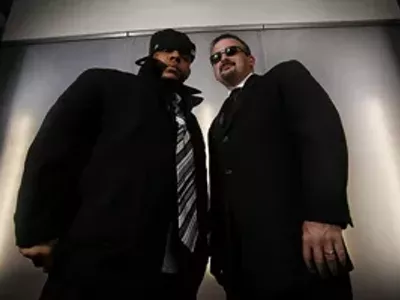Salim Washington was hooked on music as a kid in Detroit, and, since then, the music has taken him to South Africa and South America, Northern Ireland and Paris, not to mention spots along "the underground 'chitlin circuit.'" In addition to his records as a leader and sideman, 2008 saw the publication of Clawing at the Limits of Cool: Miles Davis, John Coltrane, and the Greatest Jazz Collaboration Ever (Thomas Dunne Books), which he co-authored with Farah Jasmine Griffin. The Harvard-grad saxophonist is back in town this week to play with old friends, talk about his writing and show off his own group.
1. Metro Times: It's one thing to appreciate the Miles-Trane interplay we hear on record or see in old film clips. But what else is going on that we might not consciously realize?
Salim Washington: The music is so wonderful and so powerful — probably everyone can sense that. One thing that is not necessarily as obvious is that in addition to crafting some of the most important art of the epoch, John Coltrane and Miles Davis were fashioning new versions of black masculinity in the face of the turmoil that was the 1950s. Both of these iconic musicians have imprinted their personal styles and personalities in the hearts of so many people. Miles was the epitome of the "take no shit" attitude coupled with absolute confidence and stylishness to a T; Coltrane, on the other hand, epitomizes for many the earnest seeker of truth, the spiritual prophet whose message came through music. While one man was glamorous, a genuine star with all the accoutrements that we associate with that — sports cars, luxury digs, fashion leader, movie star girlfriends — the other was a man who brought, or rather highlighted, the spiritual essence of jazz, no matter how secular the surroundings of the music business.
2. MT: Don Cheadle's Miles Davis biopic is apparently on hold. Assuming it gets back on track, who should play Trane to Cheadle's Davis?
Washington: I think they should pick a promising, accomplished actor who is not necessarily famous. Maybe that would dovetail nicely with Coltrane's own biography. After all, when he joined Miles, he was relatively unknown, and many people thought Miles should have chosen Sonny Rollins. If you consider this answer a cop-out, then let me say, perhaps someone like Jeffery Wright, who is such a good actor that he is not even recognizable from one role to the next. His success seems to rest more upon his craft than upon his star power, and that, too, is very Coltranesque. It is difficult to remember that Coltrane was not as famous and loved while he was alive as he is now. He was loved by many, but misunderstood and even attacked by critics and even some musicians. His steadfast commitment to the truth and to his art is truly inspiring.
3. MT: You're also deeply involved in the jazz of South Africa. What's the allure there?
Washington: I believe that the jazz played in South Africa is as powerful, subtle and complex as any in the world. And it is the only place where the intricacies of African-American aesthetics are understood in an organic and profound way, and not simply on the surface, or in a technical way. The social and political histories of so many South Africans are quite similar to our own histories, and this has made the resonances between our cultures quite strong. Also, South Africans are very, very hip. The complexities and existential dilemmas of the modern world that face Africans are being negotiated in ways that can be instructive for all. With musicians like Ngozi Mankunku, Bheki Mseleku, Mongezi Feza, Moses Molelekwa, Busi Mhlongo and so many more, it's easy to fall in love with South Africa!
4. MT: You go back to the late '70s in the Detroit scene with R.J. Spangler and James O'Donnell, now co-leaders of Planet D Nonet, then in the band Kuumba, the forerunner to the Sun Messengers, which you also played in. How's it feel to be hooking up with them again?
Washington: We were all so young, and I feel that I was just a fledgling. Sometimes I still feel that way! In a very real way, that music and those experiences are still a part of me. For instance, it was with R.J. that I first started listening seriously to South African jazz. We were checking out Chris McGregor and the Brotherhood of Breath, and digging Dudu Pukwana, Johnny Dyani and the rest. I would not know then that, decades later, I would win a Fulbright Fellowship to study the jazz scene in South Africa, but seeds burst forth in wondrous ways. This reunion will be delightful and I am truly excited.
5. MT: The "greatest jazz collaboration ever" is no small claim in the title of your Miles-Trane book. How do you and your co-author back it up?
Washington: The book's editor came up with the "greatest jazz collaboration ever" subtitle. We were not crazy about that subtitle, but missed the deadline to come up with something better, and so it stood. Actually, I do not believe in the concept of "the greatest" when it comes to music. After all, it's not a sports contest. Other equally great collaborations readily come to mind, such as Duke Ellington and Billy Strayhorn, Trane and Elvin Jones, Miles and Wayne Shorter, and Charles Mingus and Dannie Richmond.
Salim Washington and the Planet D Nonet play arrangements of Abdullah Ibrahim, the Brotherhood of Breath and other South African greats (and a little Sun Ra) at 7:30 on Wednesday, April 7, at the Scarab Club, 217 Farnsworth St., Detroit; 313-831-1250. Discussion at 7 p.m. Both events are free. Washington leads a quintet on Friday, April 9, at 2730 Edwin, 2730 Edwin St., Hamtramck, doors at 8; and Saturday, April 10, at Cliff Bell's, 2030 Park Ave.; 313-961-2543; $10.






